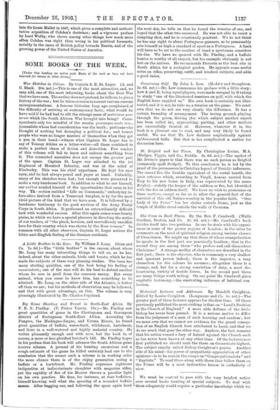SOME BOOKS OF THE WEEK.
[Under this heading we notice such Books of the week as hare not been reserved for renew in other forms.] War Sketches in Colour. By Captain S. E. St. Leger. (A. and C. Black. 20s. net.)—This is one of the most attractive, and, we may add, one of the most informing, books about the Boer War that we have seen. The author does not pretend, he tells us, to give a history of the war ; but he takes occasion to correct various current misrepresentations. A. famous historian long ago complained of the difficulty of arriving at contemporary facts; what would he have said if he had had to sift the strange mass of materiaux pour servir which the South African War brought into being? Corre- spondents only too mindful of the maxim quocunque modo rem ; journalists whose last consideration was the truth ; partisans who thought of nothing but damaging a political foe; and honest people who were no longer masters of themselves when they got a pen in their hand—witness what Captain St. Leger has to say of Tommy Atkins as a letter-writer—all these combined to make a perfect chaos of fiction and distortion. Few readers of this volume will fail to learn and unlearn something from it. The connected narrative does not occupy the greater part of the space. Captain St. Leger was attached to the 1st Regiment of Mounted Infantry, and was at the relief of Kimberley. This was his chief experience. He kept his eyes open, and he had always pencil and paper at hand. Unluckily, many of his sketches were lost; but enough were preserved to make a very handsome book. In addition to what he saw himself, our author availed himself of the opportunities that came in his way. Th 3 section entitled " Life on Commando," embodying in- formation derived from a Transvaal burgher, is by far the most vivid picture of the kind that we have seen. It is followed by a handsome testimony to the good services of the Army Postal Corps in South Africa. It performed an extraordinarily difficult task with wonderful success. After this again comes some hearty praise, to which we have a special pleasure in directing the notice of our readers, of "the pluck, heroism, and marvellously unselfish love for their country which was shown by the Boer women." In common with all other observers, Captain St. Leger notices the bitter anti-English feeling of the German residents.






































 Previous page
Previous page